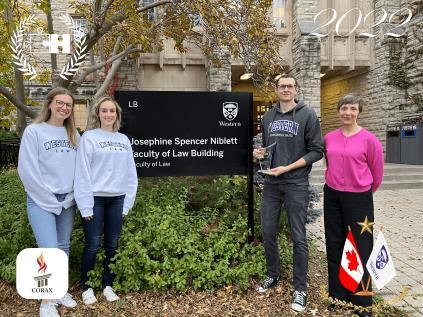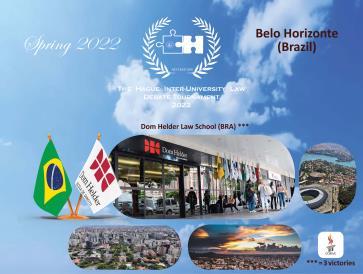

The Hague Inter-University Law Debate Tournament 2025
World league of The Hague debate style

Corax Foundation

Notable partners:




Anna Maria Urbanova and Aurelien Lorange
Presentation 2nd semester 2024
Proposition and discussion about the 8th English speaking law debate competition
(The Hague Inter-University Law Debate Tournament ed. 2025)
“Climate, Space and movements of living species" (2025 General Theme)
A “decathlon” of Inter-University debates.
“World championship of inter-university legal debates in The Hague format”




Corax Foundation

Structure of the Tournament within the Foundation
Director : Anna Maria Urbanova
Vice-Director : Aurelien Lorange

In
the heart of the City of Peace and Justice
The Hague – headquarter of operations (with remote network of members)
Professional Growth and Networking
Support the development and growth of Young Professionals, collaboration between universities around the world and provide networking opportunities between established and aspiring professionals and scholars.
3 main projects
- The Hague Inter-University Law Debate Tournament (8th edition in 2024)
- Concours Inter-Universitaire de Debat de La Haye (4th edition en 2024
- The Hague International – Academic law Journal













































Before the Tournament
Until 15th December 2024
Registration of candidate institutions (universities, law schools)
Be careful: list of candidates and waiting list per continent
In January 2025:
Validation of registration of teams
Validation of themes and topics with sponsors
Scheduling of matches
Meetings between organisers and each team to clarify the rules and reply to questions




January 2025
Debate Workshops
End of reception of registrations
February and March 2025
Tournament
- Opening Ceremony and opening match (online)
- Group Phase (online)
April 2025
- Break and Networking events with sponsors

May-June 2025
- Eliminatory Phase
- Visits in The Hague
- Finals (Hybrid)
- Awards
- Reception


July-August 2025
Publication of update of the ranking


Goals of the Tournament
A nice project which will allow :

Universities:
- Watch matches live on YouTube, ability to rewatch matches, use their students' performance content
- Create emulation among students to support their comrades during live matches.
- Promote the university and the students
- Discuss with other universities for New research collaborations, joint events, connect student associations, discover new partners.
- Show student skills and attract employers


Students:
- Meet without having to go on an exchange – in all participating countries
- Less time consuming in preparing for competition matches than a Moot Court
- Represent their university and competition with other universities around the world
- Share their performance with their friends, family, Professors and maybe employers
- A chance to become world champions of legal debates in The Hague format

*dates to be confirmed

Agenda of the THIULDT 2025
Each team is guaranteed to have a minimum of 3 matches to a maximum of 8 matches (if final reached)
IMPORTANT 1: Matches between 8.00 AM to10.00 PM (local time)
IMPORTANT 2: Possibility to ask to postpone a match if conflict with academic obligations –mandatory class, exams (minimum 2 students available to have a match)
January February March April May June
Friendly Matches
19th January 2025
Reception of the composition (2 or 3 students)
Receipt of names of judges or participation fees
7/8/9th February 2025 Opening Ceremony Announcement of the 7 subthemes of the Tournament and the groups after the draw
17th to 21st February 2025 (online) 1st Group Phase Match
3rd to 7th March 2025 (online) 2nd Group Phase Match
Between 1st and 20th April 2025
Announcement of the qualified teams for the elimination phase Networking events and with sponsors
17th to 21st March 2025 (online) 3rd Group Phase match
22nd to 25th April 2025 (online) 8th Finals
5th to 9th May 2025 (online)
Quarter Finals
19th to 23rd May 2025 (online)
Semi-Finals
12th-13th June 2025* Finals (Match for the 3rd place and Final) Visits of International Organisations in The Hague
Format of the competition
Tournament with 32 participating universities
Representing
Pacific




A « Decathlon » of Debates

Unique, Flexible and international


Team A
Opening Statements
The team will have 4 minutes to conduct the “pro” opening statements.
1st speaker has 2 minutes to present arguments and start rebuttal.
Rebuttals

Conclusion

2nd speaker has 2 minutes for rebuttal and to introduce new points.
3rd speaker has 2 minutes for rebuttal and summarize the arguments.

Team B
The team will have 4 minutes to conduct the “con” opening statements.
1st speaker has 2 minutes to present arguments and start rebuttal.
2nd speaker has 2 minutes for rebuttal and to introduce new points.
3rd speaker has 2 minutes for rebuttal and to summarize the arguments.


1 match = 30 minutes
Themes and topics

Legal themes for each stage
Examples of past themes:
- Environmental Law
- Space Law
- Public Order
- Law and Society
- Freedom of Press
- Intellectual Property


Examples of debate statements:
- Control over the online information serves the need for public order
- Economic exploitation of natural areas should be prohibited
- The freedom of press is compatible with respect for privacy
- The law follows the evolution of society and does not make it evolve

Topics kept secret up to 7 days before each match

Participating Universities (2017 - …)

Americas
University of Western Ontario (CAN)
Dom Helder Law School (BRA)
Pontificia University Of Chile (CHL)
University of Antioquia (COL)
University of Manitoba (CAN)
University of the Republic (URU)
University of the West Indies (TRT)
University of Chile (CHL)

Africa
University of Lagos (NGR)
Makerere University (UGA)
University of the Free State (RSA)
University of Lusaka (ZAM)
University of Botswana (BOS)
Strathmore University (KEN)
Asia
University of Colombo (SRI)
Kathmandu University (NEP)
National University of Singapore (SGP)
University of Burdwan (IND)
Chuo University of Tokyo (JPN)
Europe
The Hague University of A. S. (NED)
Tilburg University (NED)
Reykjavik University (ISL)
Univ. Paris 1 Pantheon Sorbonne (FRA)
Sofia University (BUL)
University of Poitiers (FRA)
University of Bologna (ITA)
Catholic University of Lille (FRA)
Ukrainian Catholic University (UKR)
University of Manchester (GBR)
Universite Francaise en Arménie (ARM)
Queen Mary University of London (GBR)
Masaryk University (CZE)
University of Porto (POR)
Tallinn University of Technology (EST)
University of Birmingham (GBR)
King’s College of London (GBR)
Luarasi University (ALB)
University of Akureyri (ISL)
State University of Tetova (North Macedonia)
Middle East
Prince Sultan University (KSA)
Qatar University (QAT)
Pacific
University of Melbourne (AUS)
University of the South Pacific (Fij-VAN)
Assessment by judges
Judges:
- Faculty members, employers with legal background or experiences, professional network, former participants (with a Master's degree level)
- Cannot be judged by judges of the same nationality or of the same university affiliation
- Can be judge of several matches during the competition
- Assesses independently of other judges
- Provides written feedback for teams after each game
- Maximum total score of 300 points (addition of the 3 judges)
- The team with the highest total score wins the match








Communication, notification, information
Emails from organisers to the teams and to their coach(es) if any All matches are broadcasted live : WebEx + YouTube Live
Information and announcements of results by email and: Corax Foundation website
https://coraxfoundation.com/competitions/the-hague-law-debatetournament/
Facebook Page
https://www.facebook.com/thehaguelawdebatetournament LinkedIn Page
https://www.linkedin.com/showcase/the-hague-law-debatetournament/

Awards
Certificates of participation
Trophy of the winner Trophy for the finalist
Trophy of the best oralist (Finals et semi-finals)
Most viewed match on YouTube fair-play Award




